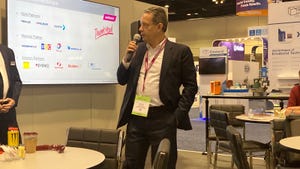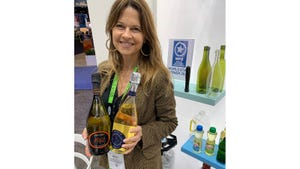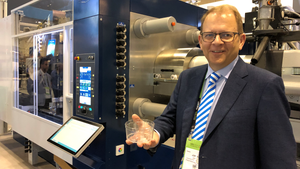European Teamwork Meets Medical Automation
November 6, 2000
TechGroup Ireland, the first European venture of The Tech Group Inc.of Scottsdale, AZ, went online in June 1998 and has been steadilygrowing since. One of the company's leading specialties is high-end,highly demanding molding applications, primarily in the medicaland electronics fields. The company launched the venture in Irelandto support several U.S. medical and high-tech companies that haveopened facilities there, and as a platform from which they couldexpand further in Europe.
The Irish operation, located near Dublin's international airport,will provide $20 million-plus of Tech Group Inc.'s more than $200million revenue in its current fiscal year. The Irish economyis the strongest in the EU at this point, and one of the principalreasons is the high-tech companies, primarily from the U.S., thathave set up European headquarters and/or manufacturing and distributionoperations in Ireland over the past few years.
Tech Group Ireland's managing director, David Moffitt, is alsothe minority owner. Moffitt says combining his local contactswith Tech Group's customer and supplier network allowed the operationto get up and running quickly. In turn, two molding machine makers(Demag and Netstal) and an automation provider (Hekuma) brought in during the startup have augmented that network. Moffitt says the automation systems have played a particularly important role.
Start With Automated Cells
Among Tech Group's first applications at the Irish operationwas a line of ink cartridges for a leading maker of computer printers.Specifications for the cartridges are very complex. Two highlycritical parts are molded as single shots in separate machines,assembled, packed, and shipped to the OEM for high-speed filling.
Because of the high quality demanded by subsequent processingoperations and the way the cartridge is used, parts are producedin a climate-controlled white room. The company also has a Class100,000 cleanroom and is currently commissioning a Class 10,000space.
The success of this cartridge application hinged mainly onthe successful integration of molding machine and automation equipment.Tech Group trialed Demag and Netstal machines, ultimately choosingboth to do the job. And it partnered with Hekuma to supply theautomation required to complete construction of the cell. Nowthe company runs six production cells, three of each machine type,all using Hekuma systems. This project set the stage for the nextapplication Tech Group had to tackle in Ireland.
New Cleanroom
We noted that Tech Group was commissioning a Class 10,000 cleanroom.Among the earliest applications produced in the new cleanroomwill be a sophisticated blood diagnostic system designed and marketedby Johnson & Johnson. Called Gemini Wells, the system consistsof a tray, into which are seated 96 individually molded wells.Each well, in application, will contain a reagent that interactswith blood samples for analysis.
The materials are HIPS and a filled PS. The production cellthat Tech Group specified to mold the wells and assemble theminto trays consists of a 96-cavity hot runner mold from Otto Männerof Germany, a 100-ton Netstal Synergy machine, and an automationsystem from Hekuma (Figures 1 and 2).
The process works like this: Stacks of separately producedtrays are fed into the automation system, which parallels thelinear axis of the molding machine. Hekuma's high-speed, side-entryrobot takes the wells from the mold using end-of-arm tooling equippedwith floating centering devices for positive connection. The robotitself is completely sealed for use inside the cleanroom.
Because Johnson & Johnson specified the tool be designedto allow individual cavity shutoff, the possibility exists thatthe press could produce less than the required 96 wells for eachtray. Hekuma therefore designed a buffer, or collecting device,into the system to ensure that at least 96 wells would alwaysbe available.
The side-entry robot takes the wells from the mold and placesthem into the line balancing station, as the buffer is called.An inventory of at least four shots of wells is collected andoriented here before placement in a tray. This may sound complicated,but Hekuma's solution is what design engineers call elegant simplicity:The count is balanced from shot to shot, the overall process isvery fast, and cycle time is not impacted.
To synchronize with the molding cycle, empty trays enter intwo lines. Filled trays exit in one line and are stacked usingan empty tray as a protective cap. The stacks are then automaticallybanded and wrapped in stretch polypropylene film.
Quality Control
There are two easily accessed quality control stations builtinto the system: One takes a full shot of wells from the mold,and the second takes a filled tray. Hekuma's dual sensor systemperforms quality checks, including emptiness of incoming trays,tray orientation, and fullness of outgoing trays. Rejected traysare automatically ejected into a clean holding area. The dualsensors ensure that a failed sensor does not stop the system.If one half of a sensor pair fails, the other continues to functionand a substitution can be made when convenient.
The initial specification called for sub-5-second cycles fora complete 96-well tray, including .4 second of mold open time.Since the full system was initialized and debugged on Hekuma'smanufacturing floor, Tech Group achieved the desired performancelevel from the start. Moffitt says the system is so well optimizedthat only a few tenths of a second could be shaved from the cycleduring Johnson & Johnson's yearlong validation testing.
Tech Group's modern facility outside Dublin, which is ISO 9002and CGMP compliant, now covers 40,000 sq ft and contains 22 injectionmachines ranging from 80 to 350 tons (Figure 3). There is spacefor 10 more, plus the building is expandable to 70,000 sq ft,which would allow up to 60 presses. There are also plans afootto expand in Europe either through acquisition or via greenfielddevelopment.
Contact information Hekuma GmbH |
You May Also Like


